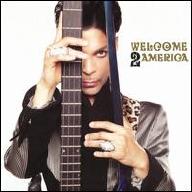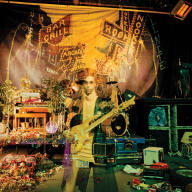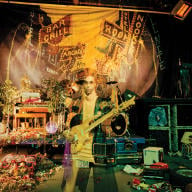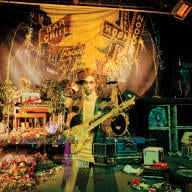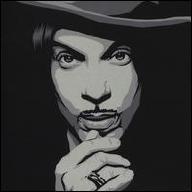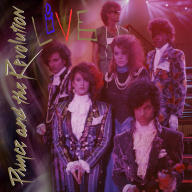Music ran in Prince's blood. The son of a jazz pianist and singer, Prince Rogers Nelson was born in Minneapolis, Minnesota on June 7, 1958. Prince taught himself how to play music at an early age and his first original songs arrived not much later. Music remained a mainstay after his parent's divorce, a period where he bounced between both households. For a while, Prince stayed with his neighbors the Andersons, whose son Andre would later adopt the stage name Andre Cymone. The pair became friends and then collaborators, forming a covers band called Grand Central with Morris Day while the three attended high school together.
Prince and Cymone's first big break arrived when Pepe Willie, the husband of Prince's cousin, brought the duo into the funk band 94 East. Prince played guitar on a few tracks on a 94 East demo and co-wrote "Just Another Sucker" with Willie, a song composed in 1977. By that point, the teenage Prince had already signed to Warner Bros. on the strength of a demo he recorded with producer Chris Moon. He headed to the Record Plant in Sausalito, California to record his debut For You, which appeared in 1978. Prince played every instrument and sang every note on For You, an audacious move for a debut. The album made some inroads on R&B radio, with its first single "Soft and Wet" reaching 12. It was quickly eclipsed by "I Wanna Be Your Lover," the first single from 1979's Prince. "I Wanna Be Your Lover" reached number one R&B and nearly cracked Billboard's Top Ten, peaking at 11. "Why You Wanna Treat Me So Bad?" gave him another significant R&B hit in early 1980, reaching number 13 on the Billboard charts, but Prince guaranteed that he wouldn't be pigeonholed as a soul act by embracing rock, pop, and new wave on 1980's Dirty Mind.
Dirty Mind was Prince's first masterpiece, a one-man tour de force of sex and music; it was hard funk with catchy Beatlesque melodies, sweet soul ballads, and rocking guitar pop all at once. It didn't perform as well as Prince on the R&B charts, but "Uptown" peaked at number five on both the Billboard Dance and R&B charts. Prince doubled down on risque rock & funk on 1981's Controversy. Pop hits eluded him this time around, but "Controversy" and "Let's Work" made the Billboard R&B chart, which wasn't the only time Prince visited these particular charts in 1981. He masterminded the eponymous debut album by the Time, a Minneapolis funk band featuring his old friend Morris Day. All this buzz led the Rolling Stones to hire Prince as an opener for part of their 1981 tour, running into audiences that were unwilling to embrace his genre-bending music. He'd soon find wider acceptance for his music with 1999.
A tightly constructed double album, 1999 served as futuristic funk-pop that showcased the extent of his range. Released in October 1982, 1999 generated three massive hits: its title track topped out at 12 but it was a staple on the fledgling MTV, while "Little Red Corvette" and "Delirious" were Top Ten hits, peaking at six and eight respectively. 1999 is also where Prince unveiled his backing band the Revolution, showcasing the group in the album's music videos and featuring them on the record's supporting tour; several members also played on 1999. Afterwards, guitarist Dez Dickerson departed and the Revolution's classic lineup of guitarist Wendy Melvoin, keyboardist Lisa Coleman, keyboardist Matt Fink, bassist Brown Mark, and drummer Bobby Z solidified. This incarnation of the Revolution was showcased on Purple Rain, the film Prince released in July 1984.
A mythologized version of his own back story largely shot in his home city of Minneapolis, Purple Rain made Prince a superstar. Preceded by the stark, startling funk of "When Doves Cry," Prince's first number one single, Purple Rain became a blockbuster, its theatrical success feeding the popularity of its soundtrack and vice-versa. For a brief period, Prince had the number one single, album, and film in the United States, a remarkable achievement. The album's subsequent singles almost all went Top Ten: "Let's Go Crazy" also went to number one, while "Purple Rain" peaked at two and "I Would Die 4 U" reached number eight ("Take Me with U," released at the end of the album's cycle, went no further than 25.) With fame came controversy: Tipper Gore formed the Parents Music Resource Center after discovering her 11-year-old daughter listening to "Darling Nikki," a sexually charged song from Purple Rain.
His stardom secured, Prince took an abrupt left turn in 1985 with Around the World in a Day, an excursion into psychedelic pop not too far removed from the Paisley Underground movement in Los Angeles; indeed, he'd give the Bangles, one of the bands at the core of the trend, "Manic Monday," which went to number two in 1986. Thanks to "Raspberry Beret," Around the World in a Day was also a hit, albeit one that paled in comparison to Purple Rain; it sold two million copies and generated only one other Top 40 hit in "Pop Life." Prince quickly followed it with Parade, which was the soundtrack to his second film, Under the Cherry Moon. Directed by Prince, the film flopped, but the eclectic Parade was another hit album, producing the number one smash "Kiss."
Prince disbanded the Revolution after the supporting tour for Parade, an excerpt of which was featured on Sign 'o' the Times, the sprawling double-album he released in March 1987. Assembled from the remnants of several incomplete projects, Sign 'o' the Times was hailed as one of Prince's best albums, showcasing the full scope of his talents. It also produced three Top Ten hits in "Sign 'o' the Times," "U Got the Look," and "I Could Never Take the Place of Your Man." Prince planned to release a collection of hard funk called The Black Album in November 1987 but he pulled the record at the last minute believing the album was too dark and immoral; it would be released in a limited run in 1994.
Prince quickly recorded Lovesexy, an album intended as a bright riposte to the darkness of the scrapped The Black Album. Lovesexy became his first album not to reach the Top Ten since Controversy and only generated one Top 40 single in "Alphabet St." Prince rebounded swiftly with Batman, an album inspired by Tim Burton's 1989 silver screen adaptation of the caped crusader. A blend of sound collage and medley, "Batdance" became Prince's first number one single since "Kiss," with "Partyman" reaching 18 later that year. Prince returned to the big screen in 1990 with Graffiti Bridge, another film he directed himself. Its accompanying album was Prince's third double-album in seven years, cobbled together from strays from the past decade and new songs, such as its lone Top Ten single "Thieves in the Temple."
With 1991's Diamonds and Pearls, Prince debuted the New Power Generation, a versatile band of professionals specializing in R&B and funk. The streamlined soul of Diamonds and Pearls gave Prince his biggest non-Batman hit since Around the World in a Day, with the slinky "Cream" becoming his last number one hit and the ballad "Diamonds and Pearls" reaching number three. The following year, Prince released his 14th album, titling it after a cryptic logo that allegedly combined the symbols for male and female. This graphic would soon be dubbed the "Love Symbol" and the album of the same name found Prince grappling with hip-hop on "My Name Is Prince" but it was the shimmering pop of "7" that gave him another Top Ten hit; fittingly, it peaked at seven on Billboard. In 1993, Prince released his first greatest-hits collection, The Hits; it was accompanied by an edition that also rounded up many of his B-sides from the 1980s.
Prince changed his name to the Love Symbol in 1993 as a protest against his label Warner Bros., who would not release new recordings from the musician as often as he desired. As the Love Symbol was unpronounceable, Prince was called "The Artist Formerly Known As Prince" (or "The Artist") during this feud with Warner, which lasted until 2000, at which time his publishing contract with Warner/Chappell expired. After releasing "The Most Beautiful Girl in the World" on his NPG Records in 1994 -- it became his last Top Ten hit, reaching number three -- Prince attempted to speed through his recording contract with Warner during the mid-'90s, beginning with 1994's Come. Bearing "The Most Beautiful Girl in the World," The Gold Experience arrived in 1995, with the postscript Chaos and Disorder closing out the contract in the summer of 1996. Prince celebrated the end of his tenure at Warner by releasing the triple-CD set Emancipation on his own NPG in November of 1996.
Greeted by warm reviews and initially strong sales -- the triple-disc set would be certified double platinum due to its size -- Emancipation didn't generate any hit singles. Abundance soon became a calling card for Prince. Just over a year after Emancipation, he released another triple-disc set named Crystal Ball. Collecting unreleased material recorded over the years, Crystal Ball was accompanied by a bonus acoustic album called The Truth; it would receive its own independent release in 2021. Soon, the market was flooded with new Prince material. Newpower Soul, an album billed to New Power Generation but effectively a new Prince album, appeared in June 1998, Warner released a disc of outtakes called The Vault: Old Friends 4 Sale in the summer of 1999, and Prince signed with Arista for Rave Un2 the Joy Fantastic, a star-studded wannabe blockbuster that performed modestly upon its November 1999 release.
Prince spent the first few years of the 2000s indulging in his love of jazz fusion on a series of records released on NPG, the first being 2001's The Rainbow Children, an album that referred to his recent conversion to the Jehovah's Witnesses. Prince returned to pop and R&B in 2004 -- and to major labels -- with Musicology, an album that brought him back into the Top Ten, while also garnering him a Grammy nomination for Best Male Pop Vocal Performance in 2005; it'd be certified double platinum by the RIAA. He consolidated his commercial comeback with 3121, which hit number one on the album charts soon after its release in March 2006. Planet Earth followed in 2007, featuring contributions from his old Revolution bandmates Wendy Lisa. In the U.K., copies were cover-mounted on the July 15 edition of The Mail on Sunday, provoking Columbia -- the worldwide distributor for the release -- to refuse distribution throughout the U.K. In the U.S., the album was issued on July 24, debuting at number three.
LotusFlow3r, a three-disc set, arrived in 2009, featuring a trio of distinct albums: LotusFlow3r itself (a guitar showcase), MPLSound (a throwback to his '80s funk output), and Elixer (a smooth contemporary R&B album featuring the breathy vocals of Bria Valente). Despite only being available online and through one big-box retailer, the set debuted at number two on the Billboard 200 chart. A year later, another throwback-flavored effort, 20Ten, became his second U.K. newspaper giveaway. No official online edition of the album was made available.
From mid-2010 to the end of 2012, Prince toured throughout Europe, America, Europe again, Canada, and Australia. In 2013, he released several singles, starting with "Screwdriver" and continuing with "Breakfast Can Wait" in the summer of that year. Early in 2014, he made a cameo appearance on the Zooey Deschanel sitcom The New Girl, appearing in the episode that aired following the Super Bowl. All this activity was a prelude to the spring announcement that Prince had re-signed to Warner Bros., the label he had feuded with 20 years prior. As part of the deal, he wound up receiving ownership of his master recordings, and the label planned a reissue campaign that would begin with an expanded release of Purple Rain roughly timed to celebrate its 30th anniversary.
First came two new albums: Art Official Age and PlectrumElectrum, the latter credited to 3rdEyeGirl, the all-female power trio that was his new-millennial backing band. Both records came out on the same day in September 2014. Almost a year to the day, he released HITnRUN: Phase One, with contributions from Lianne La Havas, Judith Hill, and Rita Ora. A sequel, HITnRUN: Phase Two, was released online in December 2015, with a physical release following in January 2016. Also in early 2016, Prince set out on a rare solo tour, a run of shows he called "Piano and a Microphone." The tour was cut short in April due to sickness, however, and Prince flew home to Minneapolis. On April 21, 2016, police were called to Paisley Park where they found Prince unresponsive; he died that day at the age of 57.
On June 2, 2016, Prince's death was ruled by the Anoka County's Midwest Medical Examiner's Office to be the result of an accidental overdose of fentanyl. His early death and incredible achievements prompted an outpouring of emotion from fans, friends, influences, and professional associates. On the following week's Billboard charts, he occupied four of the Top Ten album positions and four of the top singles positions. As the particulars of his estate were sorted out by the courts -- the singer didn't leave a will, which complicated matters -- his Paisley Park complex was opened to the public in the autumn of 2016. That holiday season, NPG and Warner released 4Ever, a double-disc hits collection that contained the unreleased 1982 outtake "Moonbeam Levels." Upon its November 22, 2016 release, it debuted at 35 on Billboard's Top 200. The long-promised expanded reissue of Purple Rain appeared in June of 2017, featuring a disc's worth of previously unreleased music from Prince's vaults. Anthology: 1995-2010, a double-disc compilation of highlights from Prince's latter-day recordings, appeared in August 2018 in conjunction with the digital re-release of his post-Warner catalog; it was part of a deal with Sony Legacy, which also masterminded physical reissues of these latter-day records in the subsequent years.
The archival Piano A Microphone 1983 appeared in September 2018; it debuted at 11 in the U.S. and 12 in the U.K. The next major reissue was Originals, a collection of Prince's original versions of 15 songs he gave to other artists. Featuring his versions of "Manic Monday," "Nothing Compares 2 You," "Jungle Love," and "The Glamorous Life," Originals arrived in June of 2019; it debuted at 15 in the U.S. and 21 in the U.K. A deluxe edition of 1999 -- containing two discs of unreleased material from Prince's vault, a live show from 1982, and a disc of single variations -- appeared later that November. In May 2020, Sony reissued all of the 2002 albums released under the "One Nite Alone" moniker as the box Up All Nite with Prince: The One Nite Alone Collection. This set was overshadowed by the September release of a Super Deluxe edition of Sign 'o' the Times, which expanded the original double-album with a wealth of unreleased studio recordings and live material.
Welcome 2 America, the first completed, unreleased album culled from Prince's vaults, appeared in July 2021. The album was recorded in March 2010 prior to his Welcome 2 America Tour and featured bassist Tal Wilkenfeld and drummer Chris Coleman. It debuted at number four upon its release. ~ Stephen Thomas Erlewine, Rovi
|
1
|
|
Kiss |
|
2
|
|
When Doves Cry |
|
3
|
|
Let's Go Crazy |



